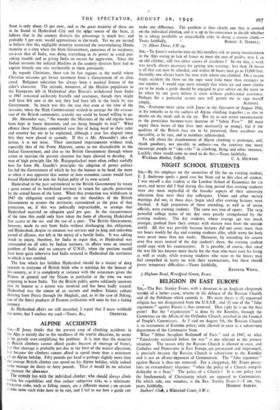NIGHT SCHOOL STUDENTS
SIR,—By his emphasis on the austerities of life for an evening student, E. J. Anderson spoils a good case for State aid to this class of student. I was myself a day student at the London School of Economics for six years, and never did I find during this long period that evening students were any more neglectful of the broader aspects of their university education than were their day colleagues. Union and other society meetings did not, in those days, begin until after evening lectures were finished. A high proportion of those attending, as well as of union, officials, were evening students. The same was true of sports. The very powerful college teams of my day were greatly strengthened by the evening students. The day students, whose average age was much younger, profited from their contact with mature men from the outside world. All this was possible because lectures did not cover more than ten hours weekly for day and evening students alike, while terms for both were never more than ten weeks. Moreover, by extending his course over five years instead of the day student's three, the evening student could cope with his examinations. It is possible, of course, that sincf the war life has become more hectic for the man who must earn his living as well as study, while evening students who were in the forces may feel compelled to hurry on with their examinations, but these should prove temporary difficulties.—Yours faithfully,
KENNETH WIGGS. 3 Higham Road, Woodford Green, Essex.






























 Previous page
Previous page